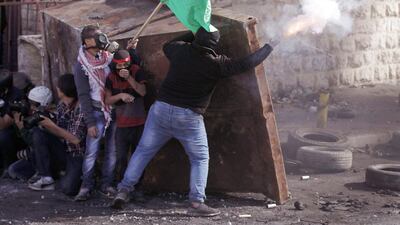RAMALLAH // The Palestinian president Mahmoud Abbas’s Fatah movement is holding the Islamist group Hamas responsible for a string of bomb attacks targeting Fatah leaders in Gaza on Friday morning, threatening reconciliation efforts between the two groups.
“The Fatah central committee condemns the crimes which took place this morning against its leaders and lays the responsiblity for these crimes upon Hamas,” senior Fatah official Nasser Al Qidwa said.
Hussein Al Sheikh, another member of the Fatah leadership, said he had “no doubt of the fact that Hamas bears the responsibility for what happened to Fatah leaders in Gaza”.
At least 10 explosions hit houses and cars belonging to senior Fatah members but no casualties were reported.
Hamas ousted Abbas loyalists from Gaza in 2007 and rival administrations ruled in the West Bank and Gaza. But earlier this year Hamas and Fatah struck a reconciliation agreement leading to the formation of a government of national unity. A rift now could jeopardise further cooperation between the two groups and jeopardise an internaionally backed effort to rebuild Gaza after a Israel’s devastating 50-day war on the territory this summer. It would also come at a time of heightened tensions with Israel in Jerusalem, where Palestinians protesters and police clashed in the Shuafat refugee camp on Friday.
Hamas, which is considered a terrorist organisation by major powers including the United States and the European Union, was quick to condemn Friday’s pre-dawn attacks but Fatah official Azzam Al Ahmad, who heads his party’s reconciliation team, said that “does not absolve Hamas from bearing full responsibility”.
“Before last night there were signals and declarations by Hamas against Fatah and Mahmoud Abbas, of which the most significant was that of a group of Hamas military officials who said they were going to torpedo planned commemorations of the death of President Yasser Arafat,” he said.
The stage for commemorations of next week’s 10th anniversary of the death of Palestinian leader and Fatah founder Yasser Arafat was also targeted in the Gaza blasts, which struck in the space of a few hours before 6.30am.
It is the first time in years that a public commemoration of Arafat’s death has been planned in Gaza. Arafat died in a French military hospital on November 11, 2004 in mysterious circumstances with many Palestinians believing he was poisoned by Israel.
The blasts prompted the Palestinian prime minister Rami Hamdallah to cancel a visit to Gaza on Saturday, where he was to meet with the European Union’s new foreign affairs chief Federica Mogherini.
Ms Mogherini warned on Friday that a new wave of violence was imminent if efforts for Israeli-Palestinian peace remained deadlocked.
Speaking on her first official visit to Jerusalem, she said there was a real “urgency” to pick up and advance the moribund peace process.
“The risk is that if we do not move forward on the political track, we will go back ... again to violence,” she said. “That’s why I see the urgency in moving forward.”
But Ms Moghereni also flagged up Israel’s settlement building on lands the Palestinians want for a future state as an “obstacle” to a negotiated peace.
Shortly afterwards, she met ythe Israeli prime minister Benjamin Netanyahu who gave a terse statement dismissing all criticism of his settlement policy.
“I reject the fictitious claim that the root of the continuous conflict is this or that settlement,” he said. “Jerusalem is our capital and as such is not a settlement.”
Palestinian anger has been fuelled by Israel’s ongoing settlement activities in Arab East Jeruslaem as well as efforts by far-right Jewish fringe groups to secure prayer rights at the Al Aqsa mosque compound, which is holy to Jews as well as Muslims.
Stone-throwing Palestinians battled Israeli police at the Shuafat refugee camp for a third straight day on Friday, with security forces firing tear gas at crowds of youths who set light to tyres and rubbish bins.
The camp descended into chaos on Wednesday after one of its residents deliberately ran down two groups of pedestrians in Jerusalem, killing a border policeman and injuring another nine people before being shot dead.
On Friday, a young Israeli also died of injuries sustained in the attack – the second of its kind in a fortnight.
Police barred men of 35 and under from attending the main weekly prayers at the Al Aqsa mosque, for fear of a repetition of heavy clashes there on Wednesday that prompted Jordan to recall its ambassador.
Police said that in the event the Old City was calm and 15,000 worshippers prayed at Al Aqsa without incident, with more than 1,300 police deployed to maintain order.
East Jerusalem has been engulfed by violence over the past four months, with clashes occurring on an almost daily basis in several flashpoint Palestinian neighbourhoods.
Community officials say the wave of unrest is fuelled by a sense of hopelessness resulting from Israel’s policies in east Jerusalem, which have left many youths with a sense they have nothing to lose.
An Israeli official said Mr Netanyahu on Friday ordered the security forces to either seal up or demolish the homes of any Palestinian involved in anti-Israeli attacks.
He said the decision was “approved” at a security meeting late on Thursday as part of a package of measures to restore calm in the city.
Before implementation, each demolition order would have to be approved by the ministry of justice, he said.
* Agence France-Presse

